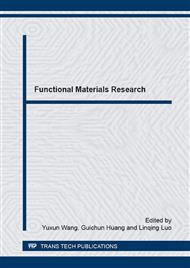[1]
Dursun T, Soutis C. Recent developments in advanced aircraft aluminum alloys [J]. Materials & Design, 2014, 56: 862-871.
DOI: 10.1016/j.matdes.2013.12.002
Google Scholar
[2]
Prantil V C, Callabresi M L, Lathrop J F, et al. Simulating distortion and residual stresses in carburized thin strips[J]. Journal of engineering materials and technology, 2003, 125(2): 116-124.
DOI: 10.1115/1.1543973
Google Scholar
[3]
YANG Y, ZHANG Z, LI L, et al. Numerical Simulation and Test of Bulk Residual Stress and Machining Distortion in Aluminum Alloy 7085[J]. Acta Aeronautica et Astronautica Sinica, 2014, 2: 029.
Google Scholar
[4]
Škerget L, Hriberšek M, Zhang D, et al. Numerical simulation of immersion quenching process for cast aluminum part at different pool temperatures[J]. Applied Thermal Engineering, 2014, 65(1): 74-84.
DOI: 10.1016/j.applthermaleng.2013.12.058
Google Scholar
[5]
Zhang L, Feng X, Li Z, et al. FEM simulation and experimental study on the quenching residual stress of aluminum alloy 2024[J]. Proceedings of the Institution of Mechanical Engineers, Part B: Journal of Engineering Manufacture, 2013: 0954405412465232.
DOI: 10.1177/0954405412465232
Google Scholar
[6]
Tanner D A, Robinson J S. Modelling stress reduction techniques of cold compression and stretching in wrought aluminum alloy products[J]. Finite elements in analysis and design, 2003, 39(5): 369-386.
DOI: 10.1016/s0168-874x(02)00079-3
Google Scholar
[7]
Zhang S, Wu Y, Gong H. A modeling of residual stress in stretched aluminum alloy plate[J]. Journal of Materials Processing Technology, 2012, 212(11): 2463-2473.
DOI: 10.1016/j.jmatprotec.2012.06.019
Google Scholar
[8]
Robinson J S, Hossain S, Truman C E, et al. Residual stress in 7449 aluminum alloy forgings[J]. Materials Science and Engineering: A, 2010, 527(10): 2603-2612.
DOI: 10.1016/j.msea.2009.12.022
Google Scholar
[9]
Koc M, Culp J, Altan T. Prediction of residual stresses in quenched aluminum blocks and their reduction through cold working processes[J]. Journal of materials processing technology, 2006, 174(1): 342-354.
DOI: 10.1016/j.jmatprotec.2006.02.007
Google Scholar
[10]
Yang X, Zhu J, Nong Z, et al. FEM Simulation of quenching process in A357 aluminum alloy cylindrical bars and reduction of quench residual stress through cold stretching process[J]. Computational Materials Science, 2013, 69: 396-413.
DOI: 10.1016/j.commatsci.2012.11.024
Google Scholar
[11]
Liu J C, Wang J L, Chen H Q. Numerical Analysis of Residual Stresses in Quenched High-Strength Aluminum Alloy Ultra-Thick Plates and their Reduction through Single-Side Cold Compression Method[J]. Advanced Materials Research, 2014, 887: 400-406.
DOI: 10.4028/www.scientific.net/amr.887-888.400
Google Scholar
[12]
Ke Y, Dong H. Pre-stretching process and its application in reducing residual stress of quenched 7075 aluminum alloy thick-plates[J]. Chinese Journal of Nonferrous Metals, 2004, 14(4): 639-645.
Google Scholar
[13]
ZHANG Y, WU Y, LI L, et al. Finite Element Simulation of Residual Stress in Pre-stretching Thick-plates of 7075 Aluminum Alloy After Quenching [J]. Hot Working Technology, 2008, 37(14): 88-91.
Google Scholar
[14]
Hu S, Zeng S The Theoretical Model of the Thermal Stress Evolution Mechanism during Quenching of no Phase Change Alloy-(1) The Corner and Edge Model for Thermal Stress during Quenching and the Corner Effect during Quenching[J]. Rare Metal Materials and Engineering, 2006, 35(4): 538~541.
Google Scholar
[15]
Wang S H, Ma K M, Ma J. Method of measuring the residual stress distribution in pre-stretched aluminum alloy plate 7075T7351[J]. Journal of Air Force Engineering University: Natural Science Edition, 2004, 5(3): 18-21.
Google Scholar
[16]
Jeanmart P, Bouvaist J. Finite element calculation and measurement of thermal stresses in quenched plates of high–strength 7075 aluminum alloy[J]. Materials science and technology, 1985, 1(10): 765-769.
DOI: 10.1179/mst.1985.1.10.765
Google Scholar


